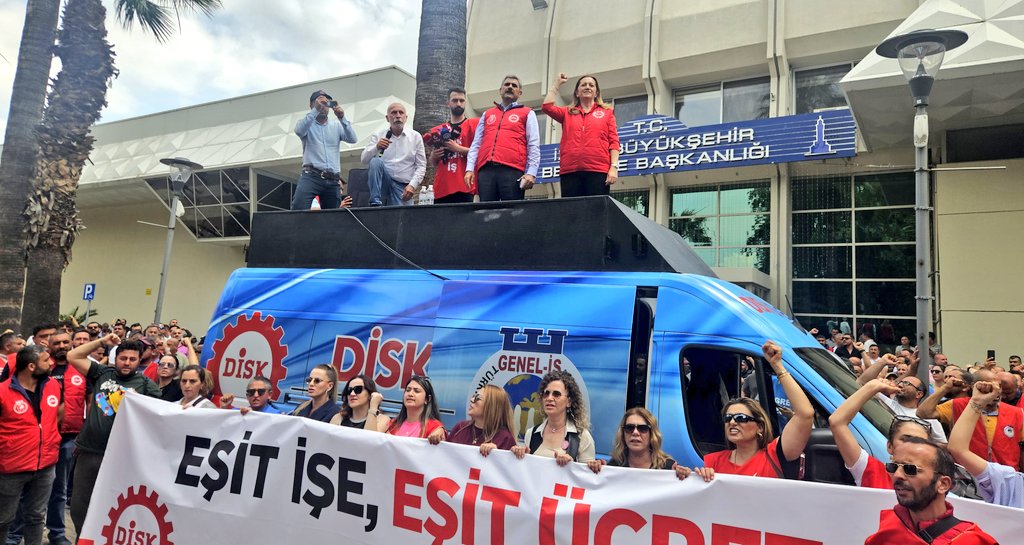A weeklong strike by municipal workers in Turkey’s third-largest city ended Wednesday after union leaders accepted a wage offer from the İzmir Metropolitan Municipality, Deutsche Welle’s Turkish edition reported.
The strike, which began on May 29, involved nearly 23,000 workers employed by municipal subsidiaries İZELMAN, İZENERJİ and Egeşehir.
Public transportation, garbage collection, childcare and other municipal services had been disrupted across the city during the strike.
The agreement includes a 30 percent wage hike for the first six months and a 19 percent raise for the following six months, based on projected inflation.
The offer was conveyed by municipal officials and SODEM-SEN, a union representing the municipality, and accepted by the DİSK-affiliated Genel-İş union.
İZELMAN workers held a vote on the final offer Monday night, resulting in the union’s decision to end the strike.
İzmir Mayor Cemil Tugay confirmed that the offer included a 30 percent raise from January 1 and a 19 percent increase starting July 1, citing an estimated inflation rate of 17 percent plus a 2-point margin.
He said the agreement preserved all other benefits, including improved terms for allowances and bonuses, while excluding only minor adjustments to continued employment and medical leave bonuses.
Tugay expressed frustration with the negotiations, accusing union leaders of politicizing the process and ignoring the financial constraints facing the city.
He said many İzmir residents had urged him not to sign an agreement that would jeopardize the municipality’s fiscal health.
Tugay claimed the union’s regional and national leadership used the dispute to make “politically charged statements” and pressure the administration beyond the financial demands of the employees.
“My aim is not to engage in politics; my aim is to manage the municipality,” he said after the agreement was finalized.
Tugay said the municipality had pushed the budget as far as possible and that further concessions would have been irresponsible.
He added that he no longer wanted to negotiate with certain union leaders, saying, “The door for talks with these individuals is closed.”
Union representative Ercan Gül denied the accusation that the union had politicized the talks, saying workers were committed to reaching a deal.
Gül said the union had remained open to dialogue throughout the strike and had not “closed the door” to anyone.
He accused the mayor of mischaracterizing the union’s position and shifting blame to labor leaders.
“He said, ‘You are blocking this process,’ but it was our members who voted,” Gül said.
The strike had drawn national attention as trash piled up in central districts, buses stopped running and public frustration mounted.
The deal brings relief to İzmir’s 4.4 million residents, who had endured a week without many basic municipal services.
The resolution may also ease tensions between Turkey’s opposition-led municipalities and labor unions, though both sides exchanged sharp criticism during the standoff.
The union has not ruled out future actions but said it will monitor the agreement’s implementation.
No court ruling or national government intervention was issued during the strike, despite legal efforts to suspend it.
Employees began returning to work Wednesday afternoon following the announcement of the agreement.
CHP mayors have faced a wave of legal investigations in recent months, including the high-profile arrest of İstanbul Mayor Ekrem İmamoğlu in March on corruption charges he denies.
İzmir Mayor Cemil Tugay has also been targeted in a separate probe over alleged vote-buying at a 2023 party congress.
Analysts say the investigations are part of a broader effort by the government to undermine the main opposition Republican People’s Party (CHP) after its strong performance in the 2024 local elections.
In a report released Monday, the International Trade Union Confederation listed Turkey among the 10 worst countries for workers, along with Bangladesh, Egypt and Burma.
The report cited mounting pressure on trade unions and growing restrictions on the right to strike as key concerns.

